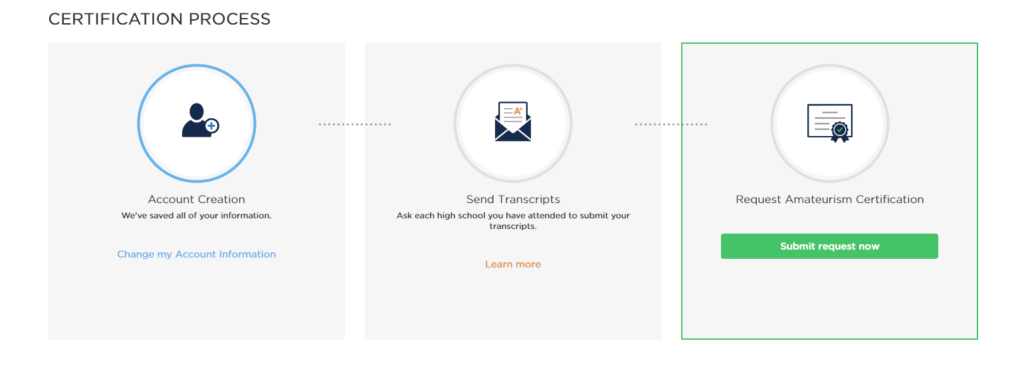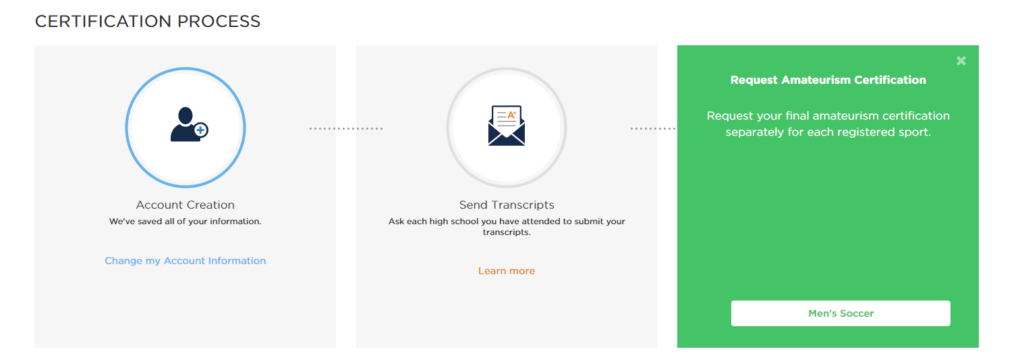NCAA Amateurism Certification: Why It Matters and How to Request It
Updated on Mar 13, 2025

As a student-athlete, you put in countless hours of hard work, dedication, and commitment to your sport. Your efforts may have even earned you a spot on an NCAA Divison I (DI) or Division II (DII) team; however, before you can compete, you must first obtain an NCAA Amateurism Certification.
All prospective student-athletes must receive a final Amateurism Certification before being eligible to compete at an NCAA DI or DII school. This includes transfers from junior colleges, NAIA, Divison III (DIII) schools, as well as all international student-athletes.
In this blog post, we will discuss what the NCAA Amateurism Certification is, why it matters, and the steps you need to take to request it.
What is an NCAA Amateurism Certification?
To be eligible to compete in NCAA sports, student-athletes must be considered an amateur, meaning they cannot accept payment for athletic performance. However, student-athletes with approved Name, Image, and Likeness (NIL) deals are still able to participate in the NCAA and are not considered professionals. The NCAA Amateurism Certification is a process that verifies your amateur status as a student-athlete.
NCAA DI or DII college-bound student-athletes enrolling in the Fall can request their Amateurism Certification starting April 1 before their collegiate enrollment. Student-athletes that are enrolling in January/midyear can request their Amateurism Certification beginning October 1 before their collegiate enrollment.
For international student-athletes enrolling for the first time at a DIII school, the dates are similar to request your final Amateurism Certification on or after April 1 (Fall enrollment) or October 1 (Winter/Spring enrollment).
Honest Insight: Only paid or fee-waived NCAA Certification accounts can request final Amateurism Certification.
The Importance of NCAA Amateurism Certification for NCAA-Bound Student-Athletes
The NCAA Amateurism Certification is a critical step in the eligibility process for student-athletes. Without it, you may be deemed ineligible and will not be allowed to play college sports, which can impact your eligibility for financial aid and scholarships.
Types of Questions That Determine Your NCAA Amateurism Status
When creating an NCAA student-athlete account, the NCAA will ask questions to assess the student-athlete’s amateur status and to determine if they have violated any NCAA rules regarding amateurism.
Here are some examples of questions that will determine your NCAA Amateurism status:
-
- Have you ever played professionally in any sport?
- Have you ever accepted payment for playing sports or received any form of compensation for your athletic abilities?
- Have you ever signed a contract or made an agreement to play professional sports?
- Have you ever accepted prize money or played on a team that offered prize money for winning games or tournaments?
- Have you ever received any other benefits or perks related to your athletic abilities, such as free equipment or training services?
- Have you ever participated in a tryout or workout for a professional sports team?
- Have you ever hired an agent or entered into an agreement with an agent to represent you for sports-related purposes?
Step-by-Step Guide to Requesting NCAA Amateurism Certification
To help clear the path to becoming an NCAA student-athlete, Honest Game has outlined the process for requesting your NCAA Amateurism Certification.
Step 1: Register with the NCAA Eligibility Center
The first step in requesting an NCAA Amateurism Certification is to register with the NCAA Eligibility Center online at www.eligibilitycenter.org. This is a one-time process that all prospective student-athletes must complete by providing basic information about themselves, their school, and their athletic participation history.
1. Students should create an Academic and Amateurism Certification account (option 3 on eligibilitycenter.org) if they’re either of the following:
- A recent high school graduate (domestic or international) enrolling for the first time at an NCAA DI or DII school, or
- Are planning to go on an official visit or sign a DI or DII Athletic Grant-in-Aid.
2. Students should create an Amateurism-Only Certification account (option 2 on eligibilitycenter.org) if they’re either of the following:
- Recent international high school graduates enrolling for the first time at an NCAA Division III school.
- Transferring from a two- or four-year college or university. (These students should check with the compliance office at the school to which they are transferring to ensure this is the correct Eligibility Center account required by that school.)
Honest Insight: International prospective student-athletes who have registered with an Academic and Amateurism Certification account (previously titled “Certification account”) do not need to create a new account and should maintain their original account.
Before requesting final amateurism certifications, students must verify that their graduation and enrollment dates in their account are accurate and complete (including payment or fee waiver). The enrollment date must reflect the term they plan to first enroll at any NCAA school. Please review and share this resource for additional information on this quick but critical process.
Step 2: Have Your High School Counselor Upload Your Transcript to the NCAA Eligibility Center Portal
Student-athletes and families are not able to upload their high school transcripts to the NCAA Eligibility Center. Instead, they must ask their High School Counselor to upload it for them. The transcript upload can be completed as early as 9th grade but must be done prior to moving on to the next step in the process.
Step 3: Complete the Amateurism Certification Questionnaire
After registering with the NCAA Eligibility Center, you must complete the amateurism questionnaire. This questionnaire will ask you about your previous sports participation, as well as any compensation or benefits you may have received, as well as your educational background. It is important to be honest and accurate when completing this questionnaire.
Honest Insight: Students should revisit all questions in the Sports section of their account before requesting final amateurism. This step ensures their account information is accurate (e.g., all teams participated on, expenses received, sponsorship received, prize money received and use of a recruiting or scouting service) to ensure a timely amateurism review.
Choose the sport for which you are requesting an Amateurism Certification. You must request a separate Amateurism Certification for every sport you want to play in college.
The next step is to verify your sports participation information. You will not be able to change your information, once you request your final Amateurism Certification. Be sure to include your high school team, as well as your private club or youth team history.
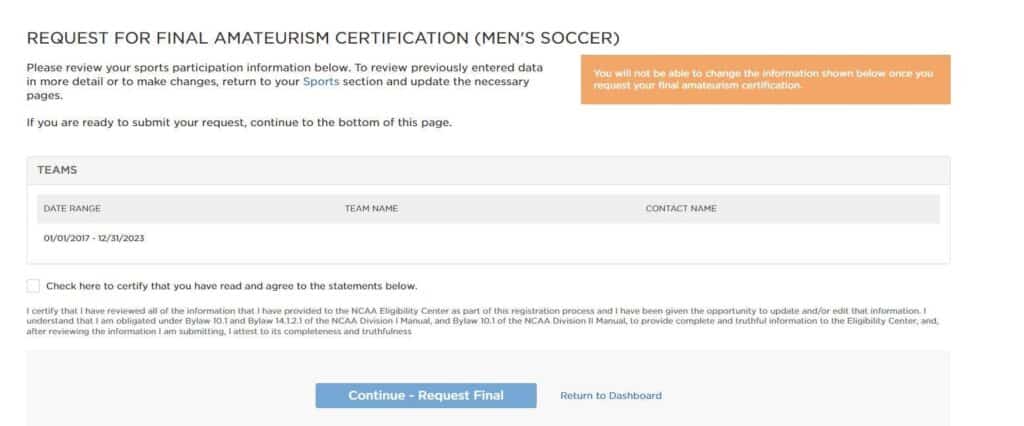
Congrats! You have completed your Amateurism Certification request.
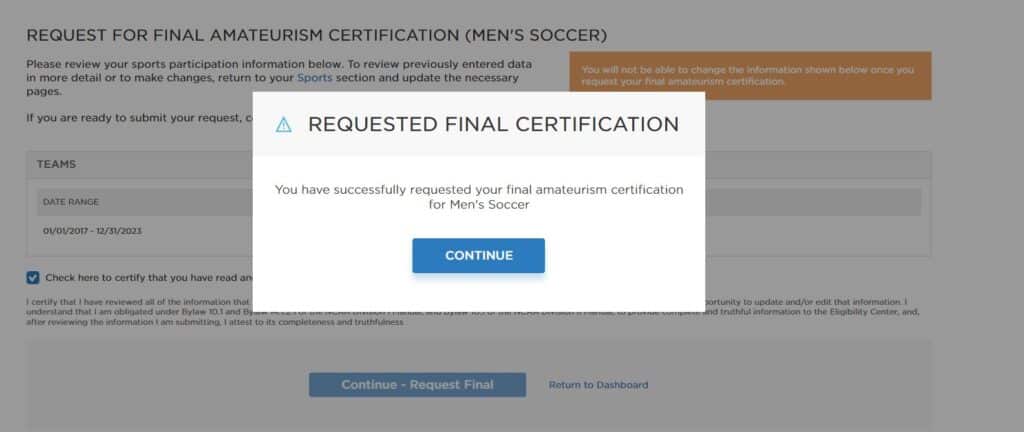
Step 4: Submit Supporting Documentation
Depending on your responses to the amateurism questionnaire, you may be required to submit additional documentation to support your amateurism status. This could include things like bank statements, tax returns, employment contracts, or educational records. Make sure you follow the instructions carefully and provide all requested documentation in a timely manner.
Step 5: Wait for the Certification to be Processed
After submitting all required documentation, you must wait for your Amateurism Certification to be processed. The NCAA Eligibility Center will review your information and determine your eligibility to play college sports.
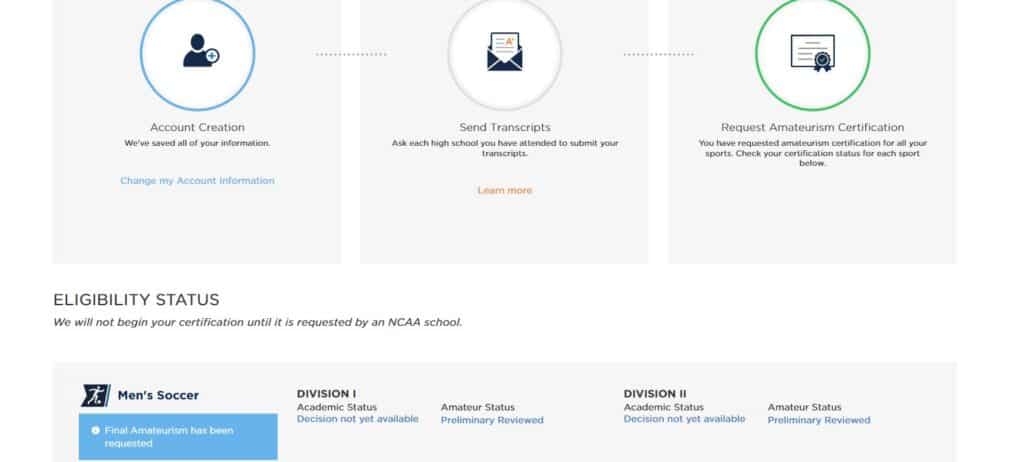
If you are deemed eligible, you will receive your certification and can move forward with your college athletic career. This can take several weeks, so it is important to start the process early to ensure that you are eligible to compete in NCAA-sanctioned events.
Your NCAA Eligibility Center Tasklist will show you have completed your Amateurism Certification process with a green checkmark. In order to compete at an NCAA school, you must complete all tasks on your NCAA Eligibility Center Tasklist.
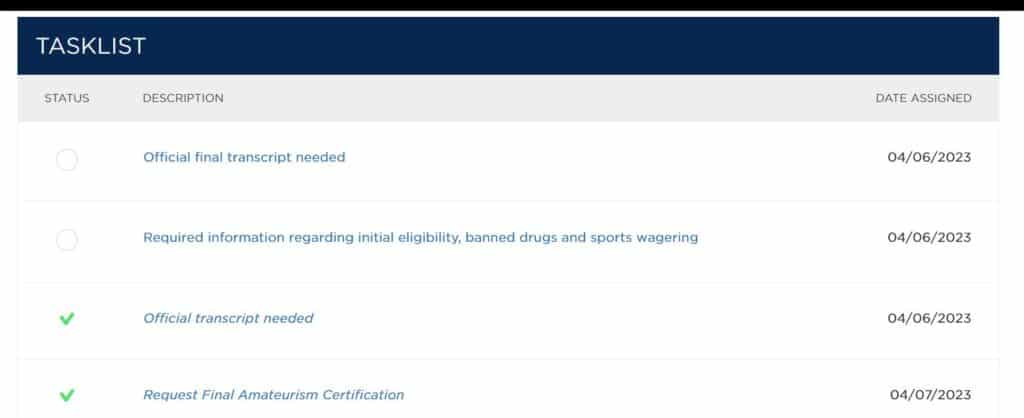
What Does It Mean? Know the NCAA Amateurism Certification Status
The NCAA has several different certification status categories for student-athletes based on their amateurism status. These certification status categories are used to help ensure that student-athletes are maintaining their amateur status and are eligible to compete at the NCAA level while also meeting academic requirements. These categories include:
Final Certified: Your Amateurism Certification has been approved by the NCAA Eligibility Center, but your ability to practice, compete or receive an athletics scholarship may still be subject to an academic review.
Final Certified With Conditions: To be eligible to compete, you must meet specific requirements laid out by the NCAA Amateurism Committee.
Final Not Certified: You are not eligible to participate in NCAA athletics or receive an athletic scholarship because you are not considered an amateur athlete.
Incomplete Web Entry: Your registration is incomplete, and the NCAA is unable to determine your status.
Not Applicable: An Amateurism Certification is not required for your sport at this division level. At the DIII level or for specific sports, you do not need an Amateurism Certification, and your amateurism will not be reviewed.
Preliminary Reviewed: A preliminary review of your amateurism status has been conducted. Your amateurism status review is ongoing and you are required to update your Eligibility Center Certification account with any future additional sports participation or information not initially entered into your account prior to requesting final Amateurism Certification.
-
- If more information is available on your amateurism status it will be in your account.
Pending Review: The NCAA Amateurism Committee needs to further review your case due to the answers raised in your questionnaire.
Suspended Review: If you are not being currently recruited by an NCAA DI or DII school, the NCAA will stop reviewing your case, even if the review was already in process. If this happens, you should contact the school or coach that was recruiting you to find out what happened.
Can the NCAA’s Amateurism Certification Decision Be Appealed?
Yes. Student-athletes are allowed to appeal the NCAA’s Amateurism Certification decision, however, you will need to work with the NCAA school since all appeals must be filed by the college or university staff.
Obtaining an NCAA Amateurism Certification is a critical step for any student-athlete who wants to compete at the college level. By following the steps outlined here, you can ensure that you are eligible to play and maintain your amateur status.
Still have questions? Honest Game’s Checklist for College-Bound Student-Athletes highlights the key steps to getting recruited and ensuring you’re on the path to academic full-qualifier status to practice, compete and earn a scholarship for college sports.

Having served on the NCAA Eligibility Center High School Advisory Board and as the College Bound Student-Athlete Advisor at Evanston Township High School (Evanston, IL), Joyce has advised more than 2,000 high school student-athletes and families on academic eligibility and recruiting.

